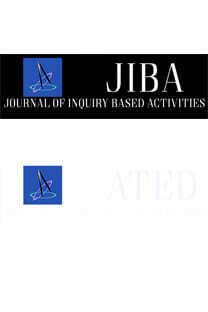A MULTI-DISCIPLINARY AND INQUIRY-BASED LEARNING ACTIVITY: THE SEVEN CONTINENTS
DİSİPLİNLERARASI VE SORGULAMA TEMELLİ BİR ÖĞRENME ETKİNLİĞİ: YEDİ KITA
___
Abdi, A. (2014). The effect of inquiry-based learning method on students' academic achievement in science course. Universal Journal of Educational Research, 2(1), 37-41.Adam, G. (2020). A critical evaluation of an EAL intervention put in place to prepare weaker EAL students for the motivation and language required at the primary stage recommendations for improvement are provided. International Journal of Advanced Research, 8(3), 684-694. doi: 10.21474/ijar01/10680
Adam, G. (2020). The purpose of education. International Journal of Advanced Research, 8(1), 983-985. doi: 10.21474/ijar01/10391
Colburn, A. (2000). An inquiry primer. Science Scope, 23(6), 42-44.
Coppersmith, S. A. & Song, K. H. (2017). Integrating primary sources, artifacts, and museum visits into the primary years program inquiry curriculum in an international baccalaureate elementary setting. Journal of Social Studies Education Research, 8(3), 24-49. https://eric.ed.gov/?id=EJ1162284
Covell, K., McNeil, J. K., & Howe, R. B. (2009). Reducing teacher burnout by increasing student engagement: A children's rights approach. School Psychology International, 30(3), 282-290.
Dann, R. (2012). Promoting assessment as learning: Improving the learning process. Routledge.
Fogarty, R. J., & Pete, B. M. (2009). How to integrate the curricula. Corwin Press.
Gokhale, A. A. (1995). Collaborative Learning Enhances Critical Thinking. Journal of Technology Education, 7(1), 22-30. https://doi.org/10.21061/jte.v7i1.a.2
Keeling, A. (2013). Learning with the international primary curriculum. Retrieved November 22, 2020, from https://theindependent.sg/learning-withthe-international-primary-curriculum/
Nurlaela, L., Samani, M., Asto, I. G. P., & Wibawa, S. C. (2018). The effect of thematic learning model, learning style, and reading ability on the students’ learning outcomes. IOP Conference Series: Materials Science and Engineering, 296, 012039. https://doi.org/10.1088/1757- 899X/296/1/012039
Smallhorn, M., Young, J., Hunter, N., & da Silva, K. B. (2015). Inquiry-based learning to improve student engagement in a large first year topic. Student Success, 6(2), 65-72.
Sotáková, I., Ganajová, M., & Babincáková, M. (2020). Inquiry-based science education as a revision strategy. Journal of Baltic Science Education, 19(3), 499-513.
Teig, N., Scherer, R., & Nilsen, T. (2018). More isn't always better: The curvilinear relationship between inquiry-based teaching and student achievement in science. Learning and Instruction, 56, 20-29.
Wicklein, R. C., & Schell, J. W. (1995). Case studies of multidisciplinary approaches to integrating mathematics, science and technology education. Journal of Technology Education, 6(2), 59-76.
- ISSN: 2146-5711
- Yayın Aralığı: 2
- Başlangıç: 2011
- Yayıncı: Mustafa ÇAKIR
SORGULAMA VE OYUNUN BÜTÜNLEŞTİRİLMESİ: KÜÇÜK ÇOCUKLARIN ASTRONOMİ İLE İLGİLİ KAVRAMSAL DEĞİŞİMLERİ
DİSİPLİNLERARASI VE SORGULAMA TEMELLİ BİR ÖĞRENME ETKİNLİĞİ: YEDİ KITA
VARYASYON TEORİSİ’NE GÖRE TASARLANAN ÖĞRENME ORTAMINDAN YANSIMALAR: ÜÇGENLERİN EŞLİĞİ
TAHMİN ET - GÖZLE – AÇIKLA - YAP: UZAKTAN EĞİTİMDE KENDİ KARBON AYAK İZİNİ HESAPLA ETKİNLİĞİ
Ayberk Bostan Sarıoğlan, Özge ŞENTÜRK ÖZKAYA
IŞIK VE SES ÜNİTESİ İÇİN OYUN TEMELLİ ETKİNLİKLER VE ÖĞRENCİ GÖRÜŞLERİ
Selin YAZICIOĞLU, SEDA ÇAVUŞ GÜNGÖREN
A MULTI-DISCIPLINARY AND INQUIRY-BASED LEARNING ACTIVITY: THE SEVEN CONTINENTS
INTEGRATION OF INQUIRY AND PLAY: YOUNG CHILDREN’S CONCEPTUAL CHANGE IN ASTRONOMY
